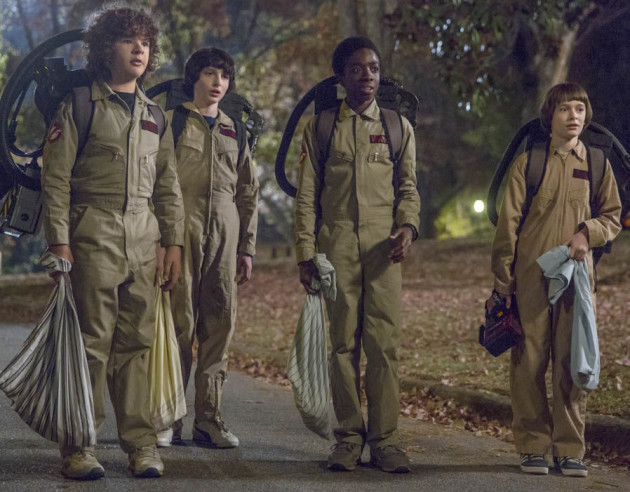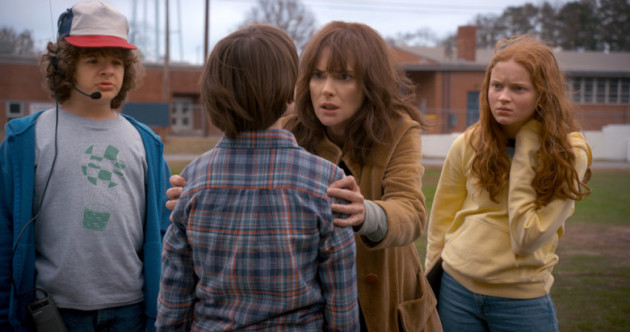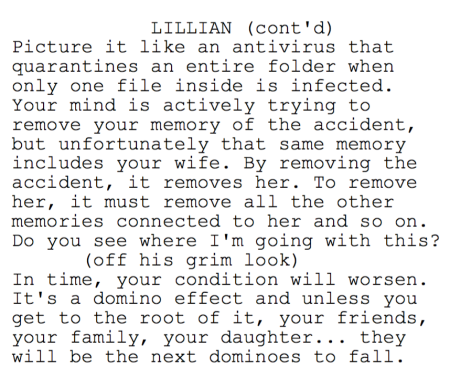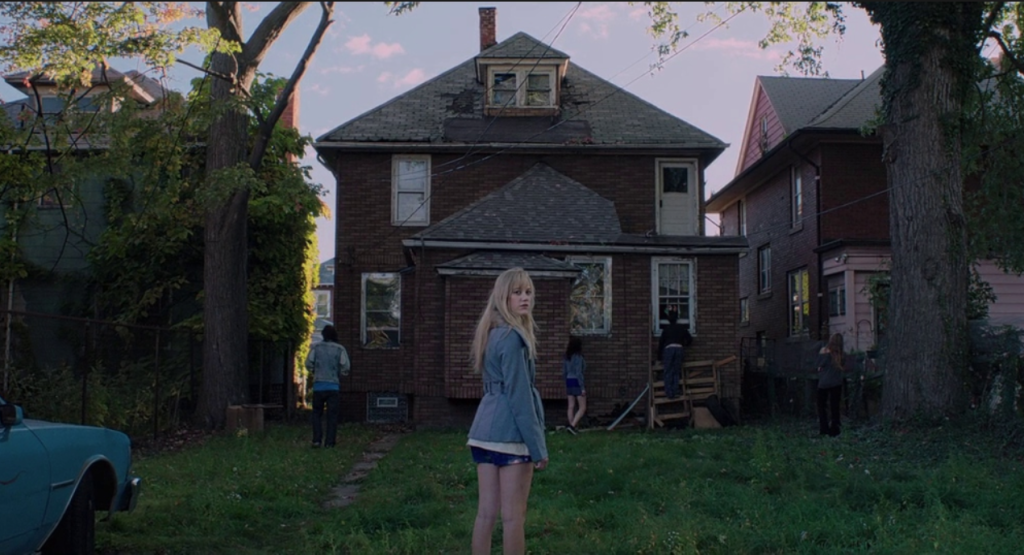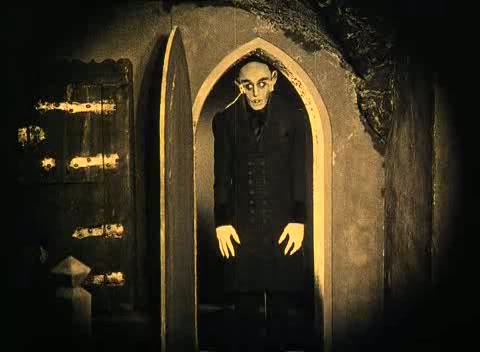Are the Duffer Brothers trolling Netflix and the rest of us?
I want you to put your Scriptshadow Imagination Cap on. Not the big one. Just the regular-sized one. This won’t require much of a leap. Got it on snug? Okay, I want you to visualize something for me. I want you to imagine a movie about four guys living in Los Angeles. Let’s call it: The Reservoir Club. Our main character – we’ll call him DAVE – likes this girl who works down at a 50s soda shop on the corner. Every weekend, the two compete in the shop’s dance competition. The place is called Dirty Mack Tim’s.
Dave’s roommate, JOHNNY, has had it rough. He lost his memory in a car accident. In fact. He can only remember things for 36 minutes at a time. So he’s started keeping tattoos on his body to remind him of the things he’s forgotten. NICK, who lives down the hall from the two, has this really fucking cool business idea. He wants to use human fat to create the single greatest shampoo in the world. He thinks it will make bank.
Oh, and let’s not forget LESTER. He’s a gimp. Walks funny. And the cops think he knows something about a recent murder. A gun-runner named Shawn Joze.
Now imagine if we lived in a world where all of this was packed into a single movie, and nobody actually complained that all of these things are giant plot points from famous 1990s movies, but rather they heaped praise on the film as a wonderful reminder of how good that period of movies was.
This is the dilemma I’m posed with when people ask me if I like Stranger Things.
Objectively speaking, the hit Netflix show does a lot of things right. The casting is top notch. The production value is great. The directing is strong. Even the writing is good. I particularly liked what they did with the plotting in the first season. They wrote 8 shows instead of the traditional streaming trend of 10. This allowed them to lay their season out like a feature screenplay, which has 8 sequences (2 in Act 1, 4 in Act 2, and 2 in Act 3). Episodes 1 and 2 became setup, Episodes 3-6 conflict, and Episodes 7 and 8 the resolution. And it works. The season never drags.
But, I mean, come on. Is there ANYTHING in this show that’s actually original?? Like even a single shot? Watching Stranger Things is like watching Steven Spielberg and Stephen King hang out and talk movies.
“Oh, that’s my shot from Close Encounters.” “Hey, they based 11 on Drew Barrymore from Firestarter. Neat!” “Didn’t I direct that exact same scene in E.T.” “Pretty sure there are about 50 scenes in here stolen from E.T. Steve old buddy.” “Cooool! Gremlins. But with a lizard!” “OMG, it’s literally like I’m rewatching Stand By Me.”
The other day, I saw an article titled, “11 Movies that Inspired Stranger Things.” I’m sorry. But if you have ELEVEN movies that inspired your movie/show, you’re doing something wrong. I don’t know about you guys. But when I release something, I want people saying, “I’ve never seen anything like this before.”
Still, the show is a hit. People love it. There’s no doubt about that. And that leads us to the question of the day: What can we learn from Stranger Things that can help us write our own hit TV show?
Well, each TV show is its own ecosystem. It’s a hit for its own reasons. But we may be able to steal a few tips from the show. I’m sure the Duffer Brothers won’t mind.
For starters, they integrated a conceptual trope that’s as rock solid as tropes get in hooking viewers – a missing kid or missing woman. There isn’t a person on this earth who doesn’t feel something when a helpless human being goes missing. So this usually gets people on board right away. At least for a couple of episodes.
That means you’ve got about 90 minutes to convince the viewers to stay with you once the missing person novelty wears off. Which means you have to use those 90 minutes judiciously. What should you focus on?
If you answered THE CHARACTERS you win a Scriptshadow cookie, which you can order with extra GSU if you so please.
Those 90 pages (or 2 episodes) need to be used to create AT LEAST half a dozen characters we fall in love with. Maybe because they’re brave. Maybe because they’re flawed. Maybe because they’re mysterious. Maybe because they’re funny. Maybe because they’re in love with a girl at school and we just HAVE to keep tuning in to see if they’re going to get her. Every time you create a character you should be asking yourself, “Why would an audience care about this person?” If you don’t have a good answer, keep working on that character.
Simultaneously, you should be establishing CONFLICT inside of the characters’ relationships. A mother and son who never get along. A sibling rivalry. Two girlfriends who both like the same guy. A marriage on the rocks. A patient (11) who’s sick of doing everything the scientist tells her to do. A military vet who doesn’t trust ANYONE in town. It doesn’t mean everyone should hate each other. Storytelling necessitates that some relationships start out strong. But if you aren’t exploring fractures in relationships, it’s one less reason for us to check back in.
To demonstrate the importance of this, think about an old friend you occasionally meet with. Imagine sitting down with that person over coffee and asking how things are going. “How’s your family?” “Great!” “How’s your work?” “Can’t complain. We just won a big case at the firm” “Last time we talked, you and your boyfriend were having trouble. How are you now?” “Oh, we’re wonderful. We communicate a lot better and I’ve learned to give him his space when he needs it, which has dissolved almost all the tension in our relationship.” And so on and so forth for 45 minutes.
How bored would you be in that conversation? Life is struggle. It’s conflict. It’s obstacles. Yes there are good times, but there are always tough times mixed in. Drama should be a reflection of that. If everybody’s happy with each other in your show, I guarantee you we’ll be bored as shit.
And remember not all conflict needs to be black and white. There just has to be an unresolved nature to it. One of the most-talked about characters in the first season of Stranger Things was Barb, the awkward best friend of Nancy Wheeler. When Nancy starts getting attention from popular bad boy, Steve Harrington, Barb tries to be supportive but senses that, if Nancy and Steve hit it off, her friendship with Nancy may be in danger. So Barb warns Nancy (“He just wants to have sex with you”) and attempts to guide her away from the “dangerous” Steve. But let’s be honest. It’s not that she feels Steve is dangerous. It’s that she feels she might lose her best friend.
As viewers, it’s in our nature to want to see conflict resolved. So we’ll stick around until that happens. As old conflicts get resolved, you’ll be weaving in new conflicts. And when those conflicts get resolved, you’ll be introducing new characters, which will allow you to create conflicts in new relationships (this is what they did this season with the red-haired girl and her Karate Kid villain brother).
However, while character and relationship conflict will be a major priority, you can’t completely abandon plot. Plot, you have to remember, GIVES YOUR CHARACTERS PURPOSE. A character who must figure out how to find a missing boy will always be more interesting than the same character who doesn’t have to do anything. So you’ve got to keep introducing new plot points to get your characters out there doing things.
Stranger Things does a pretty good job with this. For those of us who’ve seen all the 80s movies, these plot points may not be all that original. But to people who haven’t, they must seem beyond cool. Eleven is cool. The Upside-Down is cool. The secret lab stuff is cool. I’m not going to fault the Duffer Brothers for using old tricks on new dogs. I’ll never forget how devastated I was when I watched Escape from Alcatraz many years after seeing the mind-blowing Shawshank Redemption and realizing that Shawshank stole the “hide the tool in the bible” trick. The Duffer Brothers are just doing the same thing on a mass scale.
There are probably other things at play behind Stranger Things’ success. It was one of the first genre streaming projects to use the television format to create one giant movie. Imagine if Stephen Spielberg was able to make a 5 hour version of Close Encounters? I think that would’ve been pretty awesome.
Stranger Things is also distinctive in that it’s probably the most charming show I’ve seen all decade. There’s something so warm and cute about it that no matter how hard you try, you can’t stop smiling. And maybe that’s enough.
Genre: Horror
Premise: A man’s life starts to unravel when he undergoes an experimental form of hypnosis to recall what he saw during a near-death experience.
Why You Should Read: The concept of this script is very loosely based on a true story. I actually knew someone who survived a near-death experience and he hasn’t been the same since. When I asked him about it he told me he didn’t remember what he saw but I had the strange feeling he actually did and was holding back for reasons I don’t know. Since the incident he’s left his family, quit his job and went off the grid. I honestly don’t know where he is now. — I’m a huge fan of horror movies and I believe “dread” is key component is some of the best of them. Any writer can throw in some good scares here and there but building up real dread for the characters and the story on a whole seems to be overlooked in many scripts I read these days. I feel like I’ve been able encompass this with BLACK BOX without losing the pace of the story. It’s a fast entertaining read with some big scares wrapped inside an intriguing mystery. I hope you’ll take the time to check it out and look forward to your honest feedback.
Writer: Stephen Herman
Details: 100 pages
I don’t know what’s the bigger horror film on the docket this weekend, Jigsaw or Suburbicon. Bada-BUM! No, but seriously. I don’t know what’s scarier. Pennywise or George Clooney thinking he can direct satire. BADA-BUM! I’ll be here all night. Try the veal.
No, but seriously. I’ve been looking forward to today all week! Black Box bowled down the competition in last week’s Amateur Offerings, so much so that it looked like we had another Amateur Offerings success story on our hands – an event that’s becoming more and more frequent, thanks in big part to you guys.
I was only worried about one thing going into the script – the dream aspect (the hypnosis). Putting dreams in the hands of an amateur writer is a bit like putting the recipe for a Gino’s East deep dish pizza in the hands of a line cook. It’s not like that cook won’t one day become a great chef. But it’s hard to bake the most luscious crust in the world when you’re still learning where the pans are located.
One of the biggest challenges for amateur writers is narrative structure – for their script to stay focused and purposeful all the way through. Dreams are anti-structure and therefore encourage the writer to move away from purpose. As a result, they’re the script’s undoing. The narrative becomes a loosely connected series of tripped-out scenes sewn around shaky logic. Let’s hope that didn’t happen with Black Box!
40 year-old Nolan Wright is recovering from a recent car crash that killed his wife. The crash, which left Nolan dead for six minutes, resulted in brain damage so severe that it’s gradually stripping away Nolan’s memories. Lucky for Nolan, he still has his beautiful young daughter, Ava, by his side. She’s the one thing keeping him going.
However, Nolan gets word that if he doesn’t do something soon about the brain damage, the world will start slipping away from him, including Ava herself. This forces Nolan to seek out Dr. Lillian Grey, an experimental doctor who’s on the cutting edge of memory recall. Lillian believes that if Nolan can remember everything that happened during those six minutes he was dead, he can permanently heal the brain and eliminate his amnesia.
This becomes increasingly important when Nolan loses his journalist job and the Department of Children and Family Services start sniffing around, trying to decide if Nolan is a fit enough parent to take care of Ava.
Lillian’s therapy involves a literal black box that you plug yourself up to. The box helps you go into the deepest levels of your subconscious, and this is where Nolan relives his crash. On that first trip, he finds footsteps near his crash, which he follows into the woods. It’s there that he sees a dead man hanging from a tree who quickly drops and starts walking towards Nolan backwards.
Nolan’s so freaked out that he pulls himself out of the hypnosis and says he’s never coming back. But in order to keep his daughter, he has to come back, and in a series of hypno-trips, Nolan will learn that this journey extends beyond him, and to a number of people who also cheated death.
Man, I can see why everyone voted for this.
The first act is AWESOME. There was an assuredness in the writing that I wasn’t prepared for. Assuredness is a key trait of professional writing because professionals are better at knowing where their story is going. When you know where your story is going, you write with confidence. I mean, listen to how clear, dominant, and assured the character of Lillian is when she brings Nolan in.
With amateurs, there’s more of what I call the “shiny object” approach to writing. They’re often trying to figure things out on the page. Every once in awhile they’ll see something that’s interesting (a “shiny object”) and it’s like, “Ooh I’ll follow this for awhile.” Black Box didn’t have that.
Well, at least at first.
Once we got 15 pages into the second act, the tight narrative began to unravel. I could feel Stephen being tempted more and more by the shiny object, until it got to the point where it was the only thing left. The biggest problem was in explaining what was going on with Nolan.
I see this a lot. Whenever we come up with a high concept idea, there’s this pressure to construct a big flashy reason for what’s going on. So in Black Box, we find out that there are other people who also had near death experiences, and then there’s somebody who’s using these people to take their bodies and live in them… or something, because once you’ve gone through death, it’s easier to take your body?
To be honest, I barely understood it. And that’s the thing. When you try and get too big, you come up with a convoluted rule-set that’s hard to understand. And because we don’t understand it, we stop investing, we stop caring, and by the end, we don’t really know what’s happened. I know I didn’t.
Honestly, the issues in Black Box take us right back to yesterday. This shouldn’t have been about a flashy serial-body-stealing near-death-experience conspiracy. It should’ve been about characters. And this is my plea to amateur writers out there: stop trying to write the most-blowing mind-bending script ever. Just focus on the characters!
There are some good characters here. Nolan is great. The stuff with the car crash all felt honest and authentic. Ava is great. Lillian is great (minus her turn at the end). Gary is okay but could also work. The social worker who cares “a little too much” is great. Yet they get lost in this silly weird plot that doesn’t make any sense.
I mean at one point we have an ancient shaman killing a dog and becoming part of its soul. This isn’t what I signed up for.
I would strongly recommend dialing back all of the weird shit and focus more on the real-life character journeys. Keep the hypnosis scenes grounded. Have a simple and clear set of rules for what happens inside each hypnosis. Keep the mystery itself simple. Something that happened around the car crash. Don’t bring in people who died 50 years ago halfway across the world. We don’t care about them.
I know I sound like a broken record, guys. But simplify simplify simplify simplify simplify simplify simplify simplify blah blah blah a million more times.
Every time you overcomplicate things, you’re destroying your story.
Script link: Black Box
[ ] What the hell did I just read?
[x] wasn’t for me
[ ] worth the read
[ ] impressive
[ ] genius
What I learned: I love it when HUGE stakes can be conveyed simply and powerfully. Here, it takes just a single line to set up the stakes for the entire movie. It occurs when Lillian explains why this therapy is so crucial for Nolan: “In time, your condition will worsen. It’s a domino effect and unless you get to the root of it, your friends, your family, your daughter… they will be the next dominoes to fall.”
As we’ve discussed this week, horror is the easiest sell in the business. It’s the quickest way to break in as a screenwriter. And, for that reason, everyone should write at least one horror script. I can hear non-horror aficionados groaning. Slow your horror-hating roll, snoberinos. The horror genre is a river with hundreds of tributaries. There’s a path for everyone as long as you’re willing to take the ride.
You can write about goofy killer dolls (Chucky) or the possession of your only daughter (The Exorcist). You can write about a skin-burned dream-walker with knives for fingers (Nightmare on Elm Street) or a black man being invited to his potentially racist white girlfriend’s parents’ house for the first time (Get Out). You can use horror to explore mental illness (The Babadook), grief (The Others), redemption (The Sixth Sense), coming of age (Carrie), the power of friendship (It), the abuse of power (Cloverfield Lane), psychosis (Psycho).
Not enough screenwriters realize this. Horror is arguably the best genre to explore character. The assumption that it’s all about jump scares and killer clowns is incorrect. That’s the stuff that makes it onto the posters and into the trailers. But when you watch a good horror film, there’s always something deeper going on. Something to connect with.
It took me awhile to watch The Exorcist. I thought, “Old movie. Girl with twisting head. No thanks.” But when I finally did, I couldn’t get the movie out of my brain. And it wasn’t because this little girl was screaming the most terrible things imaginable to anyone who came near her. It was watching this poor mother lose hope that she could save her only child.
Take the horror out of that scenario. A mom whose kid is really sick, getting sicker every day, and every doctor she talks to tells her nothing can be done for her. That’s a horrifying situation regardless of the possession.
Lots of people think The Sixth Sense is a fancy final twist and nothing more. But it’s actually a story about redemption. This therapist’s life is gutted when one of his child patients comes back as an adult and shoots him before killing himself. It’s the ultimate embodiment of failure. Many years later, the therapist is given another chance with a new child. He feels that if he can just help this kid, he can, in a way, make up for losing that other one. It’s a story about redemption.
One of the horror films that’s stuck with me more recently is “It Follows.” And for a long time, I didn’t know why. The premise was so simplistic. You have to have sex with someone to pass along the invisible demons set on finding and killing you or take on that burden yourself. And yet, it felt like so much more than that.
I’ve since realized that the movie is actually about anxiety. It’s about the unknown fears lurking out there in the big bad world. The kind you can’t see. You wake up every day with this fear that some invisible catastrophe could strike at any moment from any direction (an awkward social encounter, your car breaking down, that asshole at work you try and avoid, a call about that overdue bill). Waking up to that fear day in and day out must be horrifying. That’s why – at least for me – the movie left such an impression. It was exploring something beyond what was shown on the surface.
I want to kill two birds with one stone here. I want you to write a horror film because horror scripts are the easiest sells in the business. But I also want you to use the genre to explore your fears and flaws as a human being. By doing so, you’ll not only be writing something that appeals to others. But you’ll actually WANT to write it.
To achieve this, think about what’s going on in your life right now. What universal issue, either within yourself or within your immediate world, is dominating your thoughts? Is it loneliness? Is it being in a dead-end relationship? Do you lack confidence? Are you in an abusive friendship? Do you have anxiety? Has your relationship with your daughter or son deteriorated? Your father? Do you feel like you’re on a treadmill and that every day is the same? Do you lack purpose?
Whichever of these things resonates most, start there and see if you can come up with a horror concept that’ll allow you to explore it. If you’re struggling with loneliness, for example, maybe you write a horror film about a guy who’s tasked with watching over a deserted spooky town in the middle of nowhere all by himself.
If you’ve wanted to get out of a relationship but don’t have the courage, maybe you write a horror film about a woman who kills her boyfriend, hides the body in the basement, and her whole life changes for the better (or worse). And whatever the issue is, it doesn’t have to directly tie into the concept. It can just as easily be restricted to the main character.
So if you struggle with confidence, maybe you make that your protagonist’s flaw. Then have your hero work at a small company, always keeping to himself. One weekend, the company goes on an impromptu retreat – a hike through the forest. During that retreat, something starts hunting them. You better believe your main character’s lack of confidence is going to be tested.
The big thing that’s going to happen when you approach horror this way is your story’s going to resonate beyond surface level because you’re exploring universal issues/flaws/fears. If you feel it, you can bet others do too. And once you’re tapping into that connection, your reader isn’t just reading your script to see what happens next. They’re reading it because they feel like they know the person the story is about.
This is one of the most powerful tools a screenwriter can use – empathy. It’s that feeling we have, as a viewer, that you and that character on the page are connected. If they can somehow overcome the monster, whatever form that monster may come in, it means you, the reader, can defeat it as well in your real life. When you give the reader hope like that – pft – it’s game over. You’ve got them for the rest of your life. They’re never gonna forget your story.
This is not to say you shouldn’t look for a marketable concept. Obviously, if you’re exploring character but your concept is boring, even Oscar-worthy character development won’t matter. But what I’m hoping for is to get you to see horror as more than just the masked man jumping out from behind the corner. It can be so much more and it SHOULD be so much more.
And if you do it right, it can become some of the best writing you’ve ever done.
Genre: Horror
Premise: Back in 1838, a real estate agent must travel to a remote castle to bring a client back to town, ignorant of the fact that the client is a vampire.
About: Yes, they’re remaking the classic, Nosferatu. If that scares you, it should help to know that the director is the same director who helmed 2015’s creepy breakout hit, The Witch – writer-director Robert Eggers. Eggers got his start in the business as a production designer, which would explain the lush attention to detail of that film.
Writer: Robert Eggers
Details: 111 pages
Double Disclosure. I was one of those people who didn’t like The Witch. I felt it was all ambience and zero story. Also, I’ve never seen Nosferatu. Sure, I’ve seen clips of it like everyone else. But despite its well known status as a classic, what I saw never intrigued me enough to make me go back and watch it. My assumption was that it was mostly about the creature design anyway. That the story would be bleh.
I’m hoping these two things aren’t a problem with this new iteration. I’m guessing that with more money comes more of a responsibility to make this market-friendly, and for that reason, both of my issues will be wiped out in one fell swoop. Let’s find out. On to some Nosferatu!
It is the year 1838. We are in the small seaside town of Wisburg, Germany. Real estate agent Thomas Hutter, and his wife, Ellen, have as rad of a life as you can expect in 1838. The only thing missing is a family and that should come as soon as Thomas starts making more money.
That opportunity presents itself when Thomas’s boss, Knock, informs him of a rich client who lives up in Transylvania who wants to buy a place here. There’s a catch. Thomas has to travel to him and bring him here, an excursion that will take two whole months.
Ellen, who’s had premonitions all her life, begs Thomas not to go. In the immortal words of Han Solo, she’s got a bad feeling about this. But Thomas wants to make that ching ching so he can get that bling bling, and goes anyway. Missssss-STAKE!
Needless to say, Thomas wakes up after the first night at Orlok’s castle with a giant bite-mark on his neck. Not only that, but Orlok has taken a creepy liking to Thomas’s picture of his wife, along with the lock of Ellen’s hair that he brought.
Note to all men: Do not carry a lock of your girlfriend’s hair near anyone named “Orlok.”
Meanwhile, back in Wisburg, Ellen starts having really fucked up sexual dreams and keeps telling anyone who will listen, “He’s coming for me.” I don’t think she means Thomas. The local doctor, Sievers, does everything he can to help Ellen, but she keeps going more and more insane.
Cut to a ship that’s now heading to Wisburg. What the crew doesn’t know is that that coffin they’ve agreed to ship to Germany? Yeah, that coffin has a vampire in it. Luckily, Thomas is racing across land to get back to Wisburg first. He instinctively knows that the extremely horny old man that is Orlok will stop at nothing to have sexy time with his wife. But I’m afraid it’s too late for that. Orlok is coming. And when he gets there, Orlok is coming.
Here’s what I’ll say about this Nosferatu. They did NOT sell out. This isn’t some made-for-Instagram-generation bastardization of a classic. While I’ve never seen the original, I’d be surprised if this new version was actually faster. Indeed, this story has all the expediency of a sailboat minus the sail.
What’s interesting about Nosferatu is that it doesn’t mine a single setting, like traditional horror films do, but rather jumps from location to location. We have the setup of Wisburg. Then we have the journey to Transylvania. Then we have the sequence at Orlok’s castle. We have the sequence of Ellen going insane. Then we have the journey BACK to Wisburg, from both Thomas and Orlok (one on land, the other on boat). And then we have Orlok finally in Wisburg (which doesn’t happen until page 75).
Why is this relevant? Well, with horror, there’s an expectation to hunker down and actually deal with the horror. When we’re jumping all over the place for half the movie before that can happen, it feels less like horror and more like adventure. And I suppose that’s okay if that’s what you’re going for. But, again, you’re working with EXPECTATIONS here. Horror audiences aren’t looking for adventure. They’re looking for horror. So if you’re not giving them a setting where horror can thrive, they get restless.
I wondered if this wouldn’t have been a better movie with Thomas AND Ellen traveling to Transylvania to meet Orlok. Staying in his castle. There are story trapping there as well, such as “How do you keep a story moving within a castle for a full 90 pages?” But there are ways to deal with that. You could’ve included some of the story in a spooky town just down the mountain from Orlok’s castle, for example.
It’s not that the story doesn’t work. Once we understand Orlok’s obsession with getting to Ellen, that plot engine keeps us engaged. Once you set up the expectation of something – assuming the components of that expectation are well-constructed – most readers will stick around to see the expectation met. Indeed, I wanted to see what would happen once Orlok got to Ellen.
But that want was more of a casual curiosity than a burning desire. I think that’s because the script introduced a ton of plot yet still managed to, somehow, feel slow. I just wanted to get to the promise of the premise. I mean, this script is titled “Nosferatu.” Let’s set this dude in a small town so he can start doing damage.
Sometimes we can fall in love with the history of our subject matter and give that precedence over the actual story. Sure, the whole Dracula on a ship thing is part of the lore. But did we really need to see that in this movie? Why not bring him and Thomas back in some spooky carriage ride, with Thomas wondering why they’re only traveling at night, and that way we’re back in Wisburg early?
Ehh, maybe I’m being too “Hollywood Executive.” Clearly this filmmaker loves slower more melodic storytelling. We’re all different. And, for all I know, he’s doing a beat-for-beat remake of the original. But that’s the thing. You DO have to respect the fact that it’s 2017. Not 1922. That has to factor into the storytelling. And I’m not sure it did.
[ ] What the hell did I just read?
[x] wasn’t for me
[ ] worth the read
[ ] impressive
[ ] genius
What I learned: When you come up with an idea, you want to ask, “What is is that audiences want to see when they come to a movie like this?” This should help inform how to approach your story. I’d imagine people would want to see a creepy movie in a castle with Nosferatu, or a creepy movie with him back in this dark dying town, Wisburg, everyone slowly goign crazy after he shows up. I’m not sure audiences want to see the logistics of how a vampire travels. But that’s just me.
Genre: Horror/Thriller
Premise: In 1984, a group of teenage friends suspect that their neighbor is a serial killer and spend the summer trying to prove it.
About: Summer of ’84 made last year’s Blood List and is currently in post-production. The writers are newbies. But the script is being directed by the trio behind the weird yet beloved breakout indie film, “Turbo Kid,” – Francois Simard, Anouk Whissell, and Yoann-Karl Whissell. I didn’t even know it was possible to have three directors on a film. Ya learn something every day!
Writers: Matt Leslie & Stephen J. Smith
Details: 111 pages
Don’t count out those 1980s nostalgia-driven small-town group of teenage friends horror movies just yet. Cause we’ve got another one coming at you courtesy of last year’s Blood List. I didn’t put much stock into “Summer” until I saw it was being directed by the trio who made Turbo Kid. At the very least, these guys have a unique voice. So their take on the Stephen King Steven Spielberg world of 80s teenagers should be interesting.
Of particular interest in today’s screenplay will be TROPES. Tropes are common beats within genres that are generally acceptable to use if they’re done well. However, if they’re not, they get hit with that most dreaded of labels – CLICHE! And no writer wants to hear that word thrown about in relation to their script. We’ll talk about tropes more in a second. In the meantime, let’s break down Summer of 84’s plot.
In case you have trouble reading titles, it’s 1984. The summer, to be exact. Davey Armstrong is 14 years old and things are looking up. He’s got a group of friends (geeky Farraday, big lug Woody, and punk Eaton, or “Eats”) that he hangs around with every day. And he’s even got a crush, 17 year old neighbor Nikki, who likes chatting with him. Life could be worse.
But Davey’s small Massachusetts’ town has been wracked by a series of missing children of late – teenagers specifically. And Davey suspects that his neighbor, 40-something Mackey, a charming cop, has been killing these kids and burying them in his backyard. At first, Davey’s friends think he’s nuts. But when someone they know goes missing and was last seen near Mackey’s house, they change their tune.
The plan is to stake out Mackey for a couple of weeks and gather evidence to bring to their parents. They know they have to be thorough because Mackey’s a cop. So that’s what they do. And because this is the 80s, their stakeout bag consists of two things – walkie-talkies and binoculars.
Meanwhile, Davey tries to get it on with the older Nikki, using her parents’ impending divorce as an emotional “in.” And it’s actually working! It seems like everything’s working until Mackey catches wind of the kids watching him. This forces the gang to unload their serial killer theory on their parents. It doesn’t go as planned, with the embarrassed parents forcing the kids to apologize to Mackey.
Their investigation a bust, it’s time to move on with their lives. And that’s what Davey plans to do. The problem is, he can’t get rid of a nagging feeling that something’s off about Mackey. It’s time to find out what’s going on once and for all. And hopefully live to tell about it.
Back to tropes.
There was a moment in Summer of ’84 where Davey waits for his mom to tuck him in for the night and leave the room. As soon as she’s gone, he busts out his walkie-talkie, calling his friends, while simultaneously watching the girl of his dreams undress in the next door house. I considered closing the script right then and there.
The 80s walkie-talkie thing. The girl undressing in the next door house. These are tropes. And tropes can work. But ONLY if they’re used alongside an otherwise original script. If the dialogue is popping. If the characters feel unlike characters we typically see in these movies. If the writing itself has a unique voice. If the plot is doing things you didn’t expect…
When you do these things, tropes work because they’re the familiar residing within the unfamiliar. However, when everything else in the story is familiar, then tropes become cliches. These kids were all kids I’ve seen before. The things they were doing (walkie-talkies, bragging about fucking moms) were all things I’ve seen before. So a trope about the girl of your dreams undressing in the adjacent house is just one more thing I’ve seen before. It’s the familiar within the familiar.
In the writers’ defense, this was likely written before Stranger Things and It came out. However! That doesn’t completely get you off the hook. If two other high profile movies/shows are making the same choices you are, regardless of whether those choices came before or after your script, it means you’re not digging deep enough. If you were digging deep enough, writers wouldn’t be using the same things you were. You’d be using stuff that NOBODY thinks of.
I also thought the dialogue could’ve been better. Whenever you have teenagers, that’s going to be a dialogue-dependent script. The dialogue will have to stand out. Some of the dialogue here is okay. But there were too many times where it only felt adequate. “I bet her hair smells like Vidal Sassoon.” “Definitely. If I was over there right now, she’d be pregnant.” “Guys, show her a little respect. Her parents are getting divorced.” “Statistically that means she’s, like, 78 percent more likely to engage in pre-marital sex.”
Not bad. But it almost feels like the safe version of how teenagers talk. That’s what I loved about Stephen King. He had his kids talk like real kids. There was never a sense that he was holding back. And that’s what makes a great writer. Someone who’s fearless and always pushing boundaries. If you’re afraid to offend or afraid to go too far, believe me, your dialogue will feel that way. Plus, King is just so damn clever. There’s always bite to his dialogue, even during the most mundane conversations.
Summer of ’84 gets better as it goes on. My favorite part was the relationship between Davey and Nikki. It felt like we were really experiencing the trauma a young girl goes through when she finds out her parents are getting divorced, and that brought some character development to a movie that was, for the most part, plot-based.
We talked about this yesterday. A plot feels empty unless you’re exploring multiple characters on a deeper level. And that’s why “It” worked. They took the time to get to know all the kids and their families. They took the time to add fears and flaws to all the kids. They even took the time to build character into the group itself, a self-identifying gang of “Losers.”
Remember, once you add an identity to a character, you can explore that character’s transformation throughout the script. So it isn’t just about “Will they catch the killer or not?” It’s about, “Will this boy ever become brave? Will he ever stand up for himself?” which was the case for the main character in Netflix’s “The Babysitter.” You can’t give your character an ending point if you never gave him a starting point.
Summer of 84’ isn’t a bad script at all. The problem is that there isn’t anything exceptional about it. If you don’t have any part of your screenplay that stands out, it makes it hard for the script itself to stand out.
[ ] What the hell did I just read?
[x] wasn’t for me
[ ] worth the read
[ ] impressive
[ ] genius
What I learned: With any horror script, there has to be a sense of danger present. Maybe not right away. But once we hit the second act, it should be there. I never felt that in Summer of ’84. It felt more like a group of kids having fun. Establish that sense of danger in your horror script and make sure the danger keeps bubbling up throughout. If we, the reader, feel safe for the majority of the journey, you’re not relying enough on fear.

